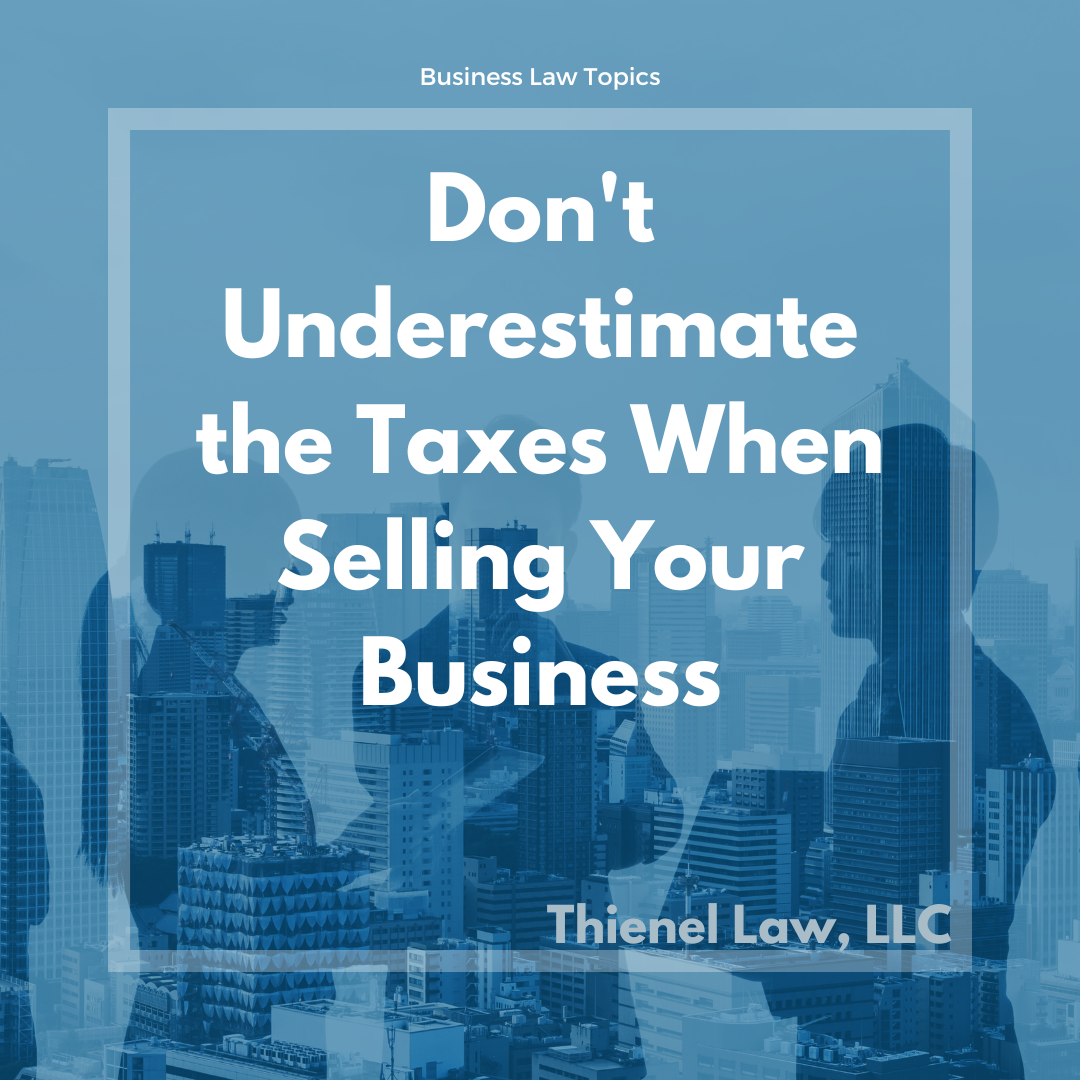Don't Underestimate the Taxes When Selling Your Business
Many factors must be considered when selling your business. Most individuals focus on the sales price for their business. However, the better question is, “How much will I put in my pocket from selling my business?”
Underestimating the taxes when selling your business could significantly reduce the net amount you receive. Consulting a Maryland business lawyer before signing a buy-sell agreement or other documents selling your interest in a business can help you avoid costly errors when estimating taxes and other costs.
Why Do I Owe Personal Taxes When I Sell My Business?
You are taxed on any income you receive from the sale of the business. The type of business and how the sale is structured directly affect the type and amount of taxes owed for a business sale. A key factor is whether you sell the ongoing business entity or the assets of the business entity. Oftentimes the buyer wants to purchase only the business assets to avoid the liabilities, known or unknown, of the business entity.
For example, suppose you sell the business assets of your limited liability company (LLC) or sole proprietorship. There, generally you pay taxes on the sale of your business as a one-time capital gain on your personal income tax return. Partnerships and S-corporations are similar in that profits from the sale are passed through to the business owners divided among the owners or shareholders. Each person is responsible for paying income taxes on their share of the earnings from selling the business.
However, selling the business assets of a C-corporation means the corporation pays corporate income taxes on the profits from selling the business. As a shareholder, you pay personal income taxes on your portion of the profits you receive from the sale. If you sell your interest in the corporate entity, only you pay taxes on the profits from the sale and not the corporation or other shareholders.
How Does Capital Gains Tax Work if I Sell My Maryland Business?
Unfortunately, taxes from selling a business are complicated. Different assets and aspects of the business fall under different tax categories. Therefore, some assets might be taxed at a higher tax rate than others. Understanding how the different aspects of your business are taxed when you sell the company can help you in a few ways.
First, understanding how each company asset is taxed lets you know the tax rate for that portion of the sale. Second, knowing the tax rate lets you correctly estimate the taxes owed on a business sale to avoid a costly tax bill. Third, using the knowledge about tax rates for business sales allows you to negotiate an agreement that minimizes your tax liability for selling the business.
Generally, the sale of a business results in federal capital gains taxes. Short-term capital gains taxes are levied against assets you sell within a year. Taxes for long-term capital gains apply to assets sold more than 12 months after acquiring the asset. Maryland capital gains are taxed at your personal income tax rate. Federal capital gains tax rates are based on your filing tax tier.
Are There Ways to Minimize Taxes When Selling My Business?
Allocation of the sale price for your business assets significantly impacts how much you pay for capital gains tax and other taxes. When you negotiate a purchase agreement for the sale of business assets, you need to pay close attention to how the sales price is allocated to each intangible and tangible asset of the business. The purchase price for each asset determines whether you report a loss or gain on the asset, and whether the net proceeds will be taxed as a capital gain or ordinary income.
A buyer typically prefers to purchase the assets of your business because that offers the buyer a tax advantage, among other things. However, selling business assets instead of the business’ stock could increase your tax liability for the business sale. The business structure is an additional factor that must be considered because not all business structures allow for stock sales.
Another factor to consider is the other terms of the sale. For example, is this a cash closing? If so, the seller receives the total sales price at closing, and capital gains are due for the tax year the business is sold. However, a purchase agreement might include other terms of sale.
For example, the seller might agree to accept a Note for deferred consideration if the buyer does not have the total purchase price at closing. Earn outs and equity rollovers might also be used when a buyer does not have sufficient cash for closing. Of course, anything other than cash at closing means the seller takes the risk of not receiving the total purchase price. On the other hand, some strategies might benefit sellers if they have a strategy for reducing potential tax consequences in the future.
The best way to minimize taxes when selling your business is to seek advice from an experienced Maryland business lawyer. A business tax attorney understands the various federal and state tax laws that apply to the sale of your business. A business tax lawyer uses various tools and strategies to negotiate a business sales agreement that minimizes your tax obligation while maximizing the amount of money you take away from the closing table.
Get More Information From an Experienced Maryland Business Lawyer
A mistake or error in your business taxes can create costly debts. It can also trigger unnecessary work and tax audits. Our Maryland business lawyer helps clients manage their business taxes to maximize tax savings and avoid tax problems.

